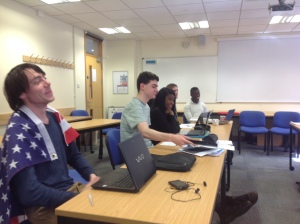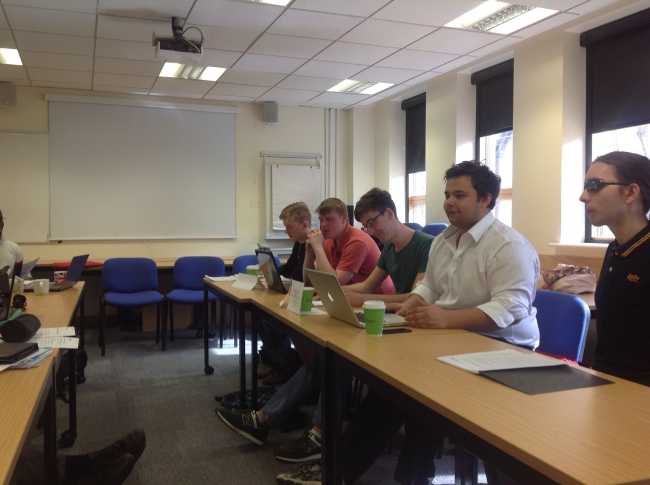The Politics and International Relations programme continues its development of simulation games as a key tool of teaching. For the Power, Politics and the State module students were tasked with representing several countries deeply involved with the Snowden spying scandal – the UK, German, Russia, Venezuela and the US – in addition to the presence of the NSA as an ‘outside adviser’ to the proceedings. The requirement for the two-hour session was for an agreement to be reached on regulating surveillance and deciding on what was, and was not, ‘allowable’.
Divisions between the participants were immediately obvious, with the US and UK not wanting any form of negotiated settlement but Venezuela and Russia demanding it, while Germany stood somewhere in the middle. With the participants making the UN Secretary General Ban Ki Moom Chairman progress was made. At the end of two hours of non-stop debate, proposal, counter-proposal and voting a draft agreement was reached that was acceptable to all sides. A new UN agency UNADCS (UN Agency for Data Collection and Supervision) composed of the states gathered for the meeting; a two tier model was agreed on, made up of legally binding regulations and ordinary guidelines; actions for breaking of the legally binding rules would be decided by veto in the case of military sanctions, and majority vote in the case of economic sanctions.
Such a sophisticated outcome was extremely impressive to witness. The students quickly grasped that to achieve an outcome they would have to compromise, negotiate and crucially innovate to ensure that all participants would be supportive. In the debrief afterwards students were clear that they had quickly come to appreciate the difficulty negotiators have is in what to compromise on and how to secure guarantees that their issues of greatest concern will not be lost in the agreed settlement.
It was another successful use of simulation games as a teaching method here in the Politics and International Relations programme, a method that will become more prevalent following the re-validation of our course approaches and content.
 Politics
Politics Anna Vanaga
Anna Vanaga 581
581




